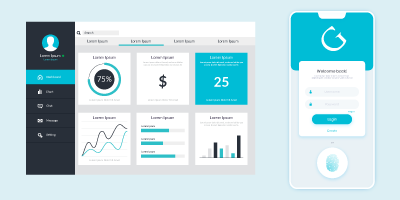If you spend enough time in discussion forums like Reddit, you will find a consistent debate on whether businesses need a mobile app. And, it’s true, not all businesses need a mobile app – in some cases, a mobile-friendly website is sufficient to engage customers. But, there are certain types of businesses that would definitely benefit from having a mobile app. For such businesses, a mobile app can become a non-negotiable asset that helps expand the reach of their brand, improve customer loyalty, generate additional revenue, build engagement, and streamline operations.
Here’s a look at some business types that would benefit from having a mobile app, and some practical advice on how to determine if you need one.
business types that benefit from having a mobile app
Financial services
The financial services industry seamlessly lends itself to B2C mobile apps as more customers are using their mobile devices for banking, budgeting, investments, and payments. Check out these statistics that speak to the popularity of mobile apps for financial services.
- A Consumer Reports survey of 2,097 U.S. adults conducted in February 2023 found that 75% of Americans use one or more banking apps.
- More than half (58%) of Millennial respondents report performing finance-related tasks on a mobile app at least once a day.
- 48% of consumers have 3 or more finance-related mobile apps currently downloaded to their mobile phone.
Mobile apps make your financial services more accessible to users, providing a fast and easy way to track and manage money, make payments, or leverage personalized features and tools. A mobile app is a must-have to stay competitive in the financial services sector.
Health & Wellness
The health and wellness industry is becoming more digital. Customers are making telehealth appointments to see doctors, nutritionists, therapists, and more; they are getting prescriptions online; and using fitness apps for workouts or to track activity.
Besides providing customers with more flexibility, mobile apps can also empower providers to deliver better care to patients. For instance, our long-time customer, Radloop, has a mobile app that allows radiologists to easily access actionable findings that are automatically extracted from reports, enabling seamless communication for follow-up care. Learn more about the app and how we built it in our case study.
So, if your business is in the health and wellness industry, a mobile app can be a great solution to build a community around common goals, offer more personalized guidance, streamline healthcare operations, and make your services more accessible.
Education
Since the pandemic, apps have taken the education industry by storm. Professionals and students are increasingly turning to apps like Duolingo and Khan Academy to learn a new language, train for a new skill, or supplement classroom-based learning. Many academic institutions are also leveraging e-learning tools to better engage their students.
If your business is in the education industry, creating a mobile app is a great way to expand the reach of your content or service. You can offer subscription-based modules to boost revenue or create gamified or personalized learning experiences to increase engagement.
Similarly, mobile apps can help academic institutions meet students where they are – on their phones! The higher education space is competitive. Having a mobile app shows students that your institution is keeping up with technology and cares about the campus experience. You can leverage the mobile app to create a centralized place for students to access campus news and resources, share communications, pay bills, manage courses and assignments, and much more. For instance, check out Emerson College’s mobile app.
Travel & Hospitality
Mobile apps make it much easier for users to access travel information on the go. Most people today use an app to plan a trip or book flights and accommodations. Think Airbnb, Hopper, and Tripadvisor.
Many food and beverage businesses, and even hotel chains, use mobile apps to deliver push notifications with discounts or offers, enable contactless check-in, streamline booking management, run loyalty programs, and more.
Building a mobile app for your travel or hospitality business is a great way to offer convenience and leverage the increasing use of smartphones to make your brand more accessible to customers.
Gaming
Mobile apps are a big deal in the gaming industry. According to a Statista Global Consumer Survey, 54 percent of the more than 7,000 U.S. adults surveyed use their smartphone to play games regularly. Consoles only come in a distant second place for Americans – around a third regularly play on one of these devices. PC/laptop takes third place with 32 percent of the survey participants.
A gaming console or PC/laptop may be out of reach for many, but a majority of the global population now owns a smartphone.
Building a mobile app for your gaming business is a great way to widen the reach of your product and allow for immersive, on-the-go experiences. You can also leverage device-specific functionality to deliver a more intuitive gaming experience.
Field Services & Distribution
Most field services businesses have agents that are on the ground, moving from one customer location to another. Having a mobile app that can operate offline, these agents can access information about work orders, communicate with team members in real-time, manage time, and schedule or close tasks. This helps simplify their day-to-day work experience and empower them to deliver better customer service.
Similarly, for distribution businesses, a mobile app can streamline and bring more automation to inventory management and enable seamless shipment tracking. For instance, our team built an iOS app for distribution company, Omni Services, which allows warehouse workers to create orders for customers by scanning barcodes without requiring network connectivity and later export them to their ERP system. This mobile app helps Omni Services improve efficiency in inventory and data management. Read more about the app in our case study.
is it worth building a mobile app for your business?
While there are certain industries or business types that are more aligned with mobile apps, it’s still important to take a step back and assess whether an app will bring value to your customers and your business. Customers don’t want to clutter their devices with excessive apps. So, here are some questions to consider before you get started.
Do your customers need a mobile app?
This can also serve as a great touchpoint to engage with your customers. Whether you send out surveys or leverage social media, find ways to directly connect with your customers and ask how they prefer to engage with your business. Are they able to sufficiently interact with your business through a mobile-friendly website, or would a mobile app enhance their user experience? You can also leverage analytics to gather some data on customer engagement. For instance, if most of your audience includes repeat customers who primarily visit your website on mobile devices, then building a mobile app may be beneficial. With a mobile app, these customers can enjoy a faster and more convenient experience.
Is there business value?
Will you offer app-exclusive features?
Give customers some compelling incentive to download your app. This can be app-exclusive features such as discounts, reward points, loyalty program, or subscriptions. If your mobile app offers something that customers cannot get on other platforms, they will be more likely to convert.
Is there sufficient ROI?
A mobile app can be a great value-add to your business’ offerings. But a mobile app requires an upfront investment in development and ongoing maintenance. So, make sure the path to ROI is clear, whether you’re looking for enhanced customer engagement, increased revenue, or more. A good idea might be to start with a minimum viable product (MVP) to gauge user feedback and adoption.
The type of mobile app is also an important consideration for ROI because it can impact the overall cost of a project and the user engagement. Learn more about native mobile apps and cross-platform apps in our blog post.
want to build a mobile app for your business?
Our developers have deep expertise in designing iOS, Android, and cross-platform apps for businesses across industries. We leverage leading platforms like AWS and React to design seamless and secure mobile apps that align with business goals. Click below to explore our mobile app development services or contact us today to get started!
Related articles
Benefits of Cross-Platform App Development For Small Businesses
In this blog post, we explore the benefits of cross-platform app development for your small business or startup.
Native App vs. Web App vs. Cross-Platform App: Which is Better?
In this blog post, we compare native app vs. web app vs. cross-platform app and explore how to choose one that’s better for your business!
What are the Top 4 Types of Application Development?
In this blog, we examine the top 4 types of application development frameworks and how to choose one that’s the right fit for your business!




